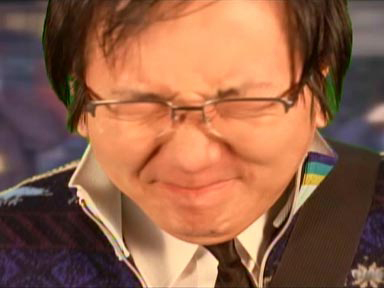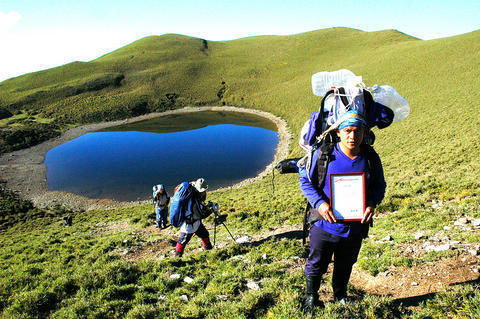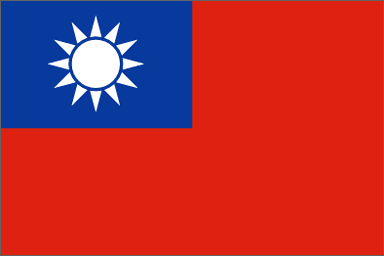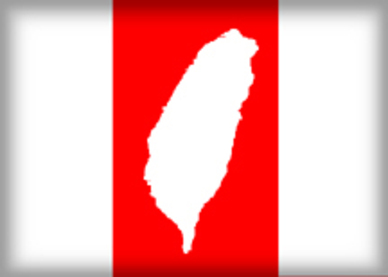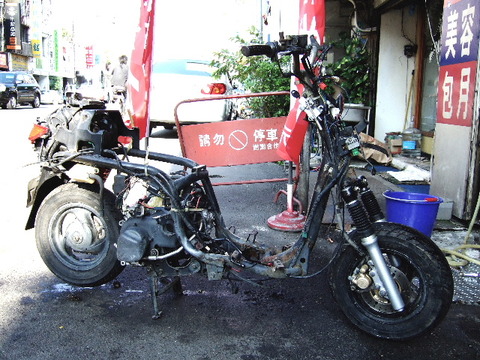What Taiwan’s relationship with China should be is something that definitely represents a challenge to anyone with small ‘l’ liberal values. Take for example, free trade. The textbook case for free trade may be a slam dunk, but what does classical theory have to say about allowing free investment into a country like China, which pressures Taiwanese industrialists into signing political pledges against Taiwanese independence? And take something else, like student exchanges. As matters stand now, the government of China allows Taiwanese students to study in China, while the government of Taiwan doesn’t return the favor. Furthermore, China recognizes degrees from Taiwanese universities even though Taiwan doesn’t do the reverse. Recently, Taiwan’s China Post wrote to say that this state of affairs is grossly unfair, in its editorial, "It’s called reciprocity":
…the concept of reciprocity means that we must treat others at least as well as they treat us. A good first step would be to recognize China’s diplomas.
Here, the China Post seems to have mysteriously forgotten one other concept. It’s called "self-interest".
I didn’t blog about it at the time, but a few weeks ago, a Taiwanese folk dance team visiting Israel had its flag snatched away by the dancers from China. "You’re not a REAL country, so we’re takin’ yer stinkin’ flag. Nyah, nyah, nyah!" Typical grown-up Chinese behavior.*
But how to respond? Should Taiwan heed the principle of reciprocity, uncoupled from self-interest, and adopt a similar policy of pro-actively snatching Chinese flags whenever it can at international venues?
Of course not. When Chinese hooligans snatch flags away at folk dance performances, they reveal themselves before all the world to be the cretinous bullies they truly are. Naive adherence to a principle of reciprocity in this instance would be self-defeating. It’s in Taiwaneses interest NOT to imitate their example, thereby demonstrating to everyone their sense of maturity is a bit greater than the tantrum-throwing babies from across the Strait.
What I’m saying is that reciprocity without consideration of one’s self-interest is a fool’s game. So, with that point made and getting back to the point of this post, is it in Taiwan’s self-interest to reciprocate, recognizing PRC degrees and allowing Chinese students to study here?
There are indeed some good arguments for doing so:
1) Understanding & peace. Chinese students in Taiwan will gain an understanding of the place and its people beyond the propaganda they’re usually exposed to, and thus be motivated to maintaining future peaceful relations between China & Taiwan. Therefore, it is definitely within Taiwan’s interests to promote such contacts.
2) Reversing Taiwanese brain drain. By not recognizing Chinese diplomas, Taiwan provides a disincentive for those of its citizens who have studied in China, and want to return home and put their skills to good use here. Taiwan’s current policy is therefore a waste of human capital.
3) Raising Taiwanese university standards. By increasing the pool of candidates for university slots here, competition for those seats would increase. That would have the positive effect of raising Taiwanese educational standards.
4) Confidence. To allow Chinese students to study in Taiwan is a powerful expression of confidence in the value of openness.
There are however, sober arguments for retaining the current system:
1) Contrary to the warm and fuzzy things we’ve been taught about understanding, it doesn’t always lead to peace, love and good feelings all around. Civil wars are often the most vicious kinds of wars precisely BECAUSE the combatants understand each other so well. Understanding is nothing more than a tool, for good or ill. On page 291 of Buying the Night Flight, Georgie Anne Geyer challenges the conventional thinking about the virtue of understanding, with this comment on the Iranian Hostage Crisis of 1979:
"You [should] have been able easily to predict that bringing eighty thousand Persian students to the United States, where they felt miserably inferior and alone and out of place, would only bring about, at the right time, a disastrous countereffect."
In fact, there are some kinds of Chinese understanding of Taiwan that are completely undesirable. To be blunt, spying would be one of them. Strategy Page reports:
"In a manner similar to Chinese espionage efforts, Chinese students [in America] are encouraged to gather seemingly innocuous data for the Chinese government. For example, who has been saying anti-Chinese government things on campus?"
As I wrote in an earlier post:
"Left unaddressed in these proposals is the possibility probability that many of these Chinese students will be tasked with identifying future collaborators, and marking other Taiwanese students for blacklists, re-education camps – or worse."
I think there’s something missing from my analysis, though. Which is, that the costs of education and living are higher in Taiwan than in China. As a result, it’s not the average Chinese student who’ll most likely be able to afford the additional expense – it’s privileged Chinese students with Communist Party connections. And that little fact (which is never mentioned) raises the probability of student spying even higher.
2) With regards to "brain drain" to China due to non-recognition of PRC diplomas, the case may be overstated. After all, there’s no law PREVENTING Taiwanese private sector firms from accepting Chinese degrees, is there? A graduate with a degree in say, Communications from a major Chinese university is just as likely to be hired in Taiwan as someone from a Taiwanese school.
Only in cases where the government invokes licensing requirements, or in the case of government work, does the current ban have any teeth. And as far as applicants for government jobs go, does Taiwan’s government really want people who have been exposed to Beijing’s anti-democracy and anti-Taiwan propaganda for several years to come back one day and suddenly take up government positions of power over Taiwanese citizens?
3) As far as raising standards, letting Chinese students study here will probably do that, but recognition of Chinese degrees in Taiwan is likely to have the opposite effect. Remember, I said that the cost of getting a degree is less in China? Well, once Chinese degrees are recognized in Taiwan, a large incentive will be created for Taiwanese students to study there, not here. That influx of Chinese students INTO the Taiwanese university system is just as likely to be met with a stampede of Taiwanese students OUT FROM the system. It’s not at all clear then, what the net effect on the university population will be.
President Chen probably overstates the case when he says, "Taiwanese professors would have to make a living by driving taxis while taxi drivers would become beggars. Taiwanese beggars would not even be able to compete with Chinese beggars." But the possibility that the number of students in Taiwan’s universities could fall from current levels cannot be discounted. Fewer students in Taiwan means more Taiwanese professors have to find other work. The line about Taiwanese beggars and Chinese beggars is just a colorful way of illustrating that.
Or is that all that it is? The China Post rightly objects, "No one is suggesting that Taiwan open its doors to the wholesale import of Chinese taxi drivers, workers or beggars." Which is true. The discussion here is about students, not workers. Yet the cynical should be forgiven if they view the opening up of the Taiwanese university market as a first step to Chinese migration.
The way it would work is this: One or two years after allowing Chinese students to study here, a NEW crisis will quickly be discovered. Some Chinese students who have studied here would now like to stay. What a shame it is that Taiwan cannot profit from their knowledge. Why, they have unique skills that Taiwanese just don’t have. And girlfriends they don’t want to leave – I can just picture the media eating up THAT angle. (Oh, don’t forget the ones that DON’T have Party connections – the ones that’ll work for a pittance. Local business loves ’em.)
Pressure mounts to issue work visas. Next stop, fast-track plans for citizenship.
Now, THERE’S one way for Chinese nationalists to cure the Taiwanese of that "provincialism complex" they go on about. Just import more Chinese nationalists!** For Taiwanese Mainlanders who never saw a case of Han imperialism they didn’t like, and who aren’t too crazy about being a minority here, Chinese immigration is the perfect way out of permanent minority status.
4) Finally, we come to the last argument. The current policy represents a lack of confidence in the virtues of openness. Indeed, it does.
But on the other hand, I know a lot of people who believe in openness who don’t lend their house keys to stalkers who brag about wanting to kill them and steal their possessions. Which is exactly the position Taiwan is in when people try to brow-beat it into friendly relations with a government that seeks nothing less than Taiwan’s destruction as a nation.
By now, you probably have an idea where I stand on the issue. Still, as a way of comparison, it would be most interesting to see how the West German and South Korean governments dealt with the issue of student exchanges with THEIR communist counterparts. Alas, during my brief web search, I couldn’t find any evidence that these governments allowed such exchanges to take place at all. The only piece I did manage to discover was this 11 page story by a BBC reporter about East German recruitment of American and British exchange students for use as spies:
In the latter decades of the Cold War, Communist spy agencies…earmarked young Americans and Britons for recruitment. The superficial thaw in East-West relations provided by bouts of detente in the 1970s and 1980s gave them the opportunity to trawl among hundreds and later thousands of Western students, Americans and Britons among them, who took part in cultural-exchange programs and studied for months, even years, at a time in the universities of the Warsaw bloc.
[…]
Based on a huge cache of hitherto secret East German intelligence documents, including complete Stasi mole files of two British academics code-named "Armin" and "Diana," Insight/BBC has established the Stasi had a high recruitment success rate among American and British exchange students. "Regardless of whether these were students from Britain or other countries, as a general rule one out of 10 attempts to recruit someone for the secret service were successful," says Pieter Richter, a former HVA analyst. Neither the CIA nor Britain’s counterintelligence service, MIS, detected the recruitments at the time. The disclosure of the Stasi’s massive clandestine recruitment drive, which comes on top of a recent wave of spy revelations in London about Soviet espionage missions against the West during the Cold War era, likely will prompt further doubts concerning the effectiveness of Western counterintelligence during the Cold War. [emphasis added]
1 out of 10 attempts at recruitment by the East German spy agency resulted in success? I do NOT like those odds.
* What a gift these episodes of flag snatching are to Taiwanese nationalists, if only they had the sense to use them in campaign commercials. Recount – or better yet, show them – on TV. Conclude by stressing how shameful it is to be Chinese, and how decent Taiwanese are. Let the KMT defend Chinese conduct to voters, if they dare. After all, THEY’RE the ones who’ve been so chummy with the Communist Party of China for the last three years now.
** Please note that I’m saying Chinese from China are likely to be Chinese nationalists (with a small "n"), not Chinese Nationalists (ie: members of the Chinese Nationalist Party, or KMT).
